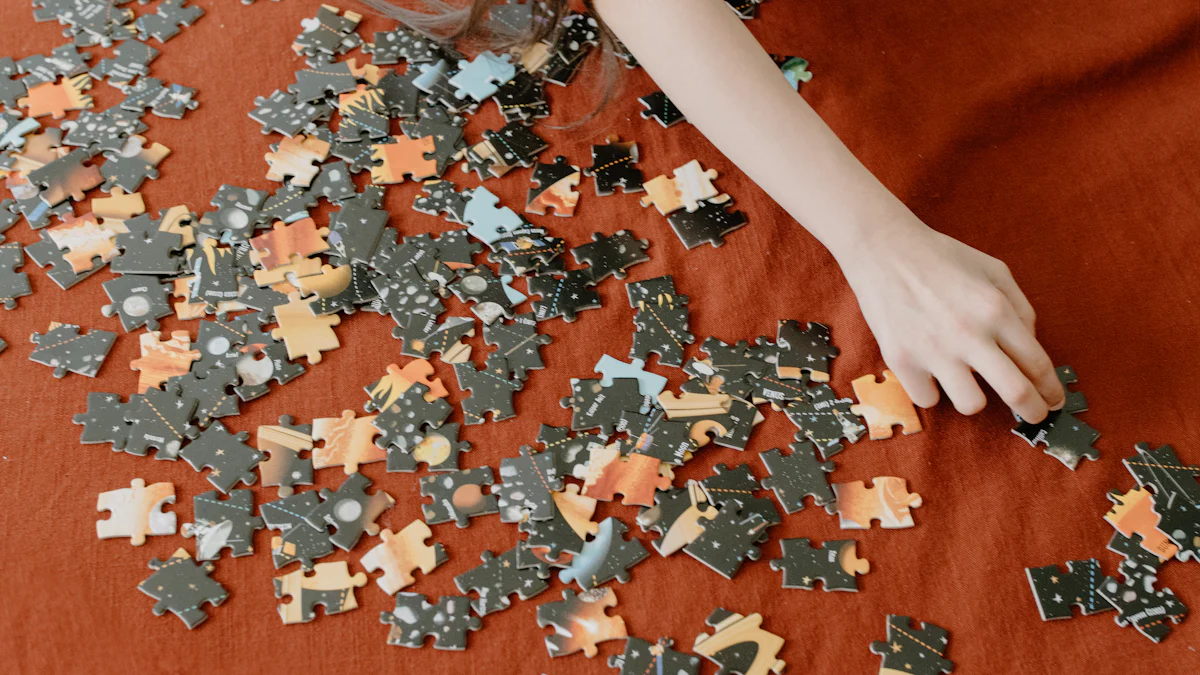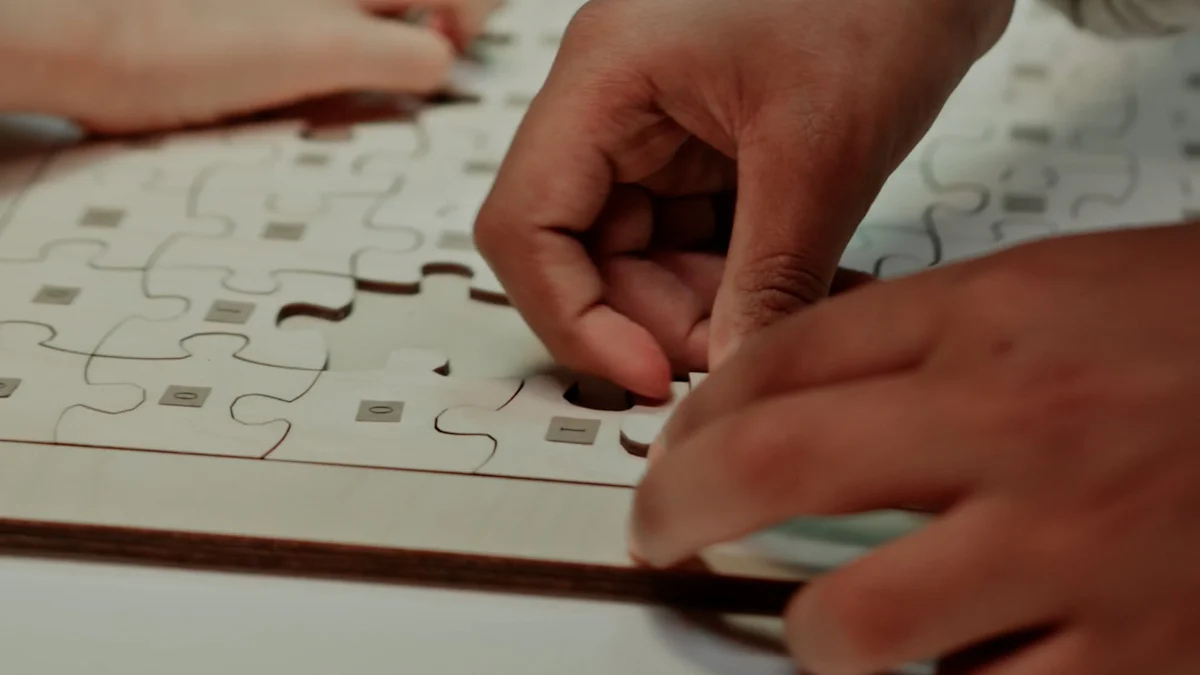
Avantages de faire des puzzles

Faire des puzzles offre de nombreux avantages qui améliorent votre bien-être mental et émotionnel. Vous vous engagez dans une activité amusante qui aiguise votre esprit et vous procure une détente. L'accessibilité des puzzles les rend attrayants pour tout le monde, quel que soit l'âge ou le niveau de compétence. Vous pouvez apprécier le défi d'assembler les pièces tout en ressentant les effets apaisants de ce passe-temps. Les avantages des puzzles vont au-delà du divertissement, offrant un moyen unique d'améliorer les compétences cognitives et de favoriser les liens sociaux. Profitez des avantages des puzzles et découvrez comment ils peuvent enrichir votre vie.
Principaux points à retenir
-
Participer à des puzzles améliore votre mémoire à court terme et vos capacités de rappel, ce qui en fait un moyen amusant de stimuler la santé du cerveau.
-
Les puzzles développent la pensée critique et les compétences de planification stratégique, qui peuvent être appliquées à des situations réelles de résolution de problèmes.
-
Travailler sur des puzzles améliore le raisonnement visuo-spatial, vous aidant à mieux comprendre comment les objets s'assemblent dans l'espace.
-
Les puzzles procurent un soulagement significatif du stress en favorisant la pleine conscience et en offrant une évasion mentale des soucis quotidiens.
-
Faire des puzzles en famille et entre amis favorise la communication et le travail d’équipe, renforce les relations et crée des souvenirs durables.
-
L’intégration de puzzles dans les milieux éducatifs améliore l’apprentissage en favorisant la pensée critique et la motricité fine.
-
Participer régulièrement à des puzzles peut enrichir votre vie, en vous procurant détente, stimulation mentale et liens plus profonds avec vos proches.
Les bienfaits cognitifs des puzzles
Mémoire améliorée
Améliorer la mémoire à court terme
Lorsque vous faites des puzzles, vous travaillez activement à améliorer votre mémoire à court terme. Chaque fois que vous regardez une pièce et essayez de vous rappeler où elle s'insère, vous exercez la capacité de votre cerveau à retenir des informations. Ce processus renforce les connexions neuronales dans votre cerveau, ce qui est bon pour votre santé cérébrale. Les avantages des puzzles s'étendent à la mémorisation des formes, des couleurs et des motifs, qui sont essentiels pour améliorer la mémoire à court terme.
Améliorer les capacités de rappel
Les puzzles améliorent également vos capacités de mémorisation. En assemblant différentes sections, vous vous souvenez constamment des tentatives et des stratégies précédentes. Cette action répétitive renforce la capacité de votre cerveau à récupérer des informations rapidement et efficacement. L'avantage du puzzle est évident : il vous aide à mieux mémoriser les détails, ce qui peut être bénéfique dans la vie de tous les jours.
Compétences en résolution de problèmes
Développer la pensée critique
Les puzzles ont pour avantage de développer l'esprit critique. Lorsque vous êtes confronté à un puzzle difficile, vous analysez chaque pièce et son adéquation potentielle. Cette analyse vous oblige à réfléchir de manière critique aux possibilités et aux résultats. Vous apprenez à évaluer différentes approches, ce qui améliore vos capacités de résolution de problèmes.
Encourager la planification stratégique
La planification stratégique est un autre avantage clé des puzzles. Vous devez planifier votre approche, en décidant si vous voulez commencer par les bords ou vous concentrer sur des couleurs spécifiques. Ce processus de planification vous encourage à anticiper et à organiser vos pensées. En faisant des puzzles, vous pratiquez la réflexion stratégique, qui peut être appliquée à diverses situations de la vie réelle.
Raisonnement visuospatial
Renforcer la conscience spatiale
Les puzzles renforcent considérablement votre perception spatiale. En manipulant les pièces, vous développez un sens aigu de la manière dont les objets s'articulent dans l'espace. Cette compétence est essentielle pour les tâches qui nécessitent de comprendre les relations spatiales, comme conduire ou naviguer dans de nouveaux environnements. Les avantages des puzzles dans ce domaine sont considérables, car ils améliorent votre capacité à percevoir et à interagir avec le monde qui vous entoure.
Améliorer la perception visuelle
Enfin, les puzzles améliorent votre perception visuelle. Vous apprenez à remarquer les différences subtiles de formes et de couleurs, ce qui aiguise vos capacités d'observation. Cette perception accrue n'est pas seulement un avantage du puzzle, mais aussi une compétence précieuse dans de nombreux aspects de la vie, de l'appréciation de l'art à l'observation scientifique.
Les bienfaits émotionnels des puzzles
Soulagement du stress
Procure un effet calmant
Lorsque vous faites des puzzles, vous ressentez un effet calmant. L'action répétitive d'assembler les pièces aide votre esprit à se détendre. Cette activité vous permet de vous concentrer sur la tâche à accomplir, ce qui peut aider à réduire l'anxiété. En vous concentrant sur la recherche de la bonne pièce, votre esprit s'éloigne des soucis quotidiens. Ce changement procure un sentiment de paix et de tranquillité, ce qui en fait un outil précieux pour soulager le stress.
Offrir une évasion mentale
Les puzzles offrent une évasion mentale loin de l'agitation de la vie quotidienne. En vous immergeant dans le puzzle, vous entrez dans un monde de créativité et d'imagination. Cette évasion vous permet de faire une pause dans la réalité et de recharger votre énergie mentale. Les avantages des puzzles incluent cette opportunité de s'éloigner des facteurs de stress et de profiter d'un moment de solitude et de réflexion.
Pleine conscience et concentration
Encourager la conscience du moment présent
Faire des puzzles vous encourage à rester dans le moment présent. Vous vous concentrez sur chaque pièce, en examinant sa forme et sa couleur, ce qui renforce votre pleine conscience. Cette pratique vous aide à devenir plus conscient de votre environnement et de vos pensées. En vous concentrant sur le puzzle, vous cultivez un sentiment de présence qui peut améliorer votre bien-être général. Les avantages des puzzles s'étendent à la promotion d'un état d'esprit attentif qui est bon pour votre cerveau.
Améliorer la concentration
Les puzzles améliorent votre concentration en exigeant une attention soutenue. En travaillant à la réalisation du puzzle, vous entraînez votre cerveau à se concentrer pendant des périodes prolongées. Cette pratique renforce votre capacité à vous concentrer sur des tâches dans d'autres domaines de la vie. L'avantage du puzzle est évident : il améliore votre endurance mentale et aiguise votre concentration. Ces bienfaits pour la santé contribuent à un esprit plus attentif et plus engagé.
Avantages sociaux de l'avantage du puzzle

Liens familiaux
Créer des expériences partagées
Les puzzles sont une formidable occasion de renforcer les liens familiaux. Lorsque vous vous réunissez autour d'un puzzle, vous créez des expériences communes qui rapprochent tout le monde. Chaque pièce que vous placez devient une partie d'un effort collectif, favorisant un sentiment d'unité. Cette activité partagée permet aux membres de la famille de se connecter à un niveau plus profond, de renforcer les relations et de créer des souvenirs durables. L'avantage du puzzle ici est la joie de travailler ensemble vers un objectif commun.
Développer ses compétences en communication
Réaliser un puzzle en famille permet également d'améliorer les compétences en communication. Vous discutez de stratégies, partagez vos observations et proposez des suggestions. Cette interaction encourage un dialogue ouvert et une écoute active. En communiquant sur le puzzle, vous apprenez à exprimer clairement vos idées et à comprendre les points de vue des autres. Ces compétences sont inestimables dans la vie de tous les jours, ce qui fait que les avantages du puzzle s'étendent au-delà de l'activité elle-même.
Travail d'équipe et collaboration
Favoriser la résolution coopérative des problèmes
Les puzzles sont d'excellents outils pour favoriser le travail d'équipe et la collaboration. Lorsque vous travaillez sur un puzzle avec d'autres personnes, vous participez à une résolution coopérative des problèmes. Chaque personne apporte des idées et des approches uniques, contribuant ainsi au succès du groupe. Cette collaboration vous apprend à valoriser des perspectives diverses et à travailler en harmonie avec les autres. Les avantages des puzzles incluent le développement d'un état d'esprit axé sur l'équipe, ce qui est bon pour votre cerveau.
Améliorer la dynamique de groupe
Les puzzles améliorent la dynamique de groupe. En collaborant, vous apprenez à gérer différentes personnalités et différents styles de travail. Cette expérience vous aide à instaurer la confiance et le respect au sein du groupe. Les bienfaits de cette interaction sur la santé sont importants, car ils favorisent les liens sociaux positifs et améliorent le bien-être mental. En participant à des puzzles, vous créez un environnement favorable où chacun se sent valorisé et inclus.
Applications pratiques des puzzles
Cadres éducatifs
Soutenir l’apprentissage dans les écoles
Les puzzles jouent un rôle essentiel dans les environnements éducatifs. Ils offrent une expérience d'apprentissage pratique qui engage activement les élèves. Lorsque vous utilisez des puzzles en classe, vous aidez les élèves à développer leur esprit critique et leurs compétences en résolution de problèmes. Ces activités encouragent les élèves à penser de manière logique et à établir des liens entre différentes informations. En intégrant des puzzles dans les cours, vous créez un environnement interactif qui améliore l'apprentissage et la rétention.
Les enseignants ont souvent recours aux puzzles pour enseigner des matières comme les mathématiques, les sciences et la géographie. Par exemple, un puzzle de géographie peut aider les élèves à en apprendre davantage sur les pays et les continents. Cette méthode rend l'apprentissage plus agréable et plus mémorable. Les avantages des puzzles dans l'éducation vont au-delà du domaine scolaire. Ils améliorent également la motricité fine et la coordination œil-main, qui sont essentielles pour les jeunes apprenants.
Améliorer les programmes éducatifs
Les programmes éducatifs bénéficient grandement de l'inclusion de puzzles. Vous pouvez utiliser des puzzles pour compléter les méthodes d'enseignement traditionnelles, en offrant une gamme variée d'expériences d'apprentissage. Les puzzles encouragent la collaboration entre les élèves, favorisant le travail d'équipe et les compétences en communication. Lorsque les élèves travaillent ensemble pour résoudre un puzzle, ils apprennent à partager des idées et à écouter les points de vue des autres.
L'intégration de puzzles dans les programmes éducatifs favorise également l'apprentissage différencié. Vous pouvez adapter les puzzles à différents niveaux de compétence et styles d'apprentissage, en veillant à ce que chaque élève puisse participer et en tirer profit. Cette adaptabilité fait des puzzles un outil précieux pour les enseignants qui cherchent à créer des environnements d'apprentissage inclusifs et efficaces.
Utilisations thérapeutiques
Assister aux séances de thérapie
Les puzzles offrent des avantages thérapeutiques importants. Les thérapeutes utilisent souvent les puzzles comme outil pour aider les clients lors des séances de thérapie. Le processus de résolution d'un puzzle offre une expérience apaisante et méditative, aidant les individus à se détendre et à se concentrer. Cette activité peut être particulièrement bénéfique pour les personnes aux prises avec le stress ou l'anxiété.
Les puzzles servent également de moyen pour les thérapeutes d’observer et d’évaluer le fonctionnement cognitif et émotionnel. En travaillant sur les puzzles, les thérapeutes peuvent mieux comprendre leurs capacités de résolution de problèmes, leur souci du détail et leur patience. Ces informations aident les thérapeutes à adapter leur approche aux besoins spécifiques de chaque client.
Soutenir les initiatives en matière de santé mentale
Les initiatives en matière de santé mentale bénéficient de l’inclusion de puzzles. Ces activités favorisent le bien-être mental en offrant un moyen constructif d’évacuer le stress et la tension. La participation à des activités de type puzzle peut améliorer l’humeur et procurer un sentiment d’accomplissement. La nature répétitive des puzzles encourage la pleine conscience, permettant aux individus de se concentrer sur le moment présent et de réduire les pensées négatives.
Les puzzles offrent également des possibilités d'interaction sociale, essentielles pour la santé mentale. Les activités de puzzle en groupe peuvent aider les individus à créer des liens et à favoriser un sentiment de communauté. Les avantages des puzzles pour la santé s'étendent à l'amélioration des fonctions cognitives et de la mémoire, ce qui les rend bons pour votre cerveau. En intégrant des puzzles dans des initiatives de santé mentale, vous soutenez le bien-être général et créez un impact positif sur la vie des individus.
Intégrer les puzzles dans la vie quotidienne
Intégrer des puzzles à votre routine quotidienne peut améliorer votre bien-être mental et émotionnel. En créant un espace dédié aux puzzles et en faisant de la réalisation de puzzles une activité régulière, vous pouvez profiter des nombreux avantages qu'offrent les puzzles.
Aménagement d'un espace puzzle
Créer un espace dédié
Désignez un espace spécifique dans votre maison pour faire des puzzles. Cet espace doit être calme et exempt de distractions, vous permettant de vous concentrer entièrement sur la tâche. Un espace dédié aux puzzles vous aide à établir une routine et facilite le retour à votre puzzle lorsque vous avez du temps libre. Assurez-vous que l'espace dispose d'un bon éclairage et d'une disposition confortable des sièges pour améliorer votre expérience de puzzle.
Choisir les bons puzzles
Choisissez des puzzles qui correspondent à vos centres d'intérêt et à votre niveau de compétence. Tenez compte du nombre de pièces, de la complexité de l'image et du thème. Commencer par des puzzles plus simples peut renforcer votre confiance et augmenter progressivement la difficulté à mesure que vous gagnez en expérience. Choisir les bons puzzles vous permet de rester engagé et motivé pour les terminer.
Faire des puzzles une routine
Planifier un temps de puzzle régulier
Réservez des moments précis dans la semaine pour faire des puzzles. La régularité vous aide à développer une habitude et vous permet de récolter régulièrement les bénéfices cognitifs et émotionnels. Que ce soit quelques minutes par jour ou une session plus longue le week-end, avoir un créneau horaire pour faire des puzzles vous permet de vous détendre et de vous concentrer sur le moment présent.
Impliquer la famille et les amis
Invitez votre famille et vos amis à vous rejoindre pour des activités de puzzle. Cette expérience partagée favorise les liens sociaux et renforce les relations. Travailler ensemble sur un puzzle encourage la communication et le travail d'équipe, ce qui en fait une activité de groupe amusante et enrichissante. Impliquer d'autres personnes dans votre routine de puzzle ajoute de la variété et crée des souvenirs durables.
Les puzzles offrent de nombreux avantages qui améliorent votre bien-être cognitif, émotionnel et social. Ils aiguisent votre mémoire, renforcent vos capacités de résolution de problèmes et améliorent le raisonnement visuo-spatial. Sur le plan émotionnel, ils soulagent le stress et favorisent la pleine conscience. Sur le plan social, ils favorisent les liens familiaux et le travail d'équipe. En intégrant les puzzles à votre routine quotidienne, vous pouvez profiter de ces avantages et enrichir votre vie. Faites des puzzles une activité régulière pour vous détendre, vous stimuler mentalement et renforcer vos liens avec vos proches. Profitez de la joie et des bienfaits des puzzles pour un mode de vie plus sain et plus épanouissant.
FAQ
Pourquoi les puzzles sont-ils bénéfiques pour le développement cognitif ?
Les puzzles stimulent votre cerveau en sollicitant de multiples fonctions cognitives. Ils améliorent la mémoire, améliorent les capacités de résolution de problèmes et stimulent le raisonnement visuospatial. En travaillant sur des puzzles, vous exercez votre cerveau, ce qui contribue à maintenir votre vivacité mentale.
Pourquoi les puzzles aident-ils à réduire le stress ?
La nature répétitive des puzzles procure un effet apaisant. Lorsque vous vous concentrez sur l'assemblage des pièces, votre esprit s'éloigne des facteurs de stress. Cette activité favorise la relaxation et offre une évasion mentale, réduisant ainsi les niveaux d'anxiété et de stress.
Pourquoi les familles devraient-elles faire des puzzles ensemble ?
Faire des puzzles en famille permet de partager des expériences et de renforcer les liens. Cela encourage la communication et le travail d'équipe, favorisant ainsi un sentiment d'unité. Travailler ensemble sur un puzzle permet de créer des souvenirs durables et d'améliorer les relations familiales.
Pourquoi les puzzles sont-ils utilisés dans le cadre éducatif ?
Les puzzles favorisent l'apprentissage en impliquant les élèves dans des activités pratiques. Ils développent la pensée critique et les capacités de résolution de problèmes. Les puzzles améliorent également la motricité fine et la coordination œil-main, ce qui en fait de précieux outils pédagogiques.
Pourquoi les thérapeutes utilisent-ils des puzzles lors des séances ?
Les thérapeutes utilisent des puzzles pour offrir une expérience apaisante et méditative aux clients. Les puzzles aident les individus à se détendre et à se concentrer, offrant un aperçu de leur fonctionnement cognitif et émotionnel. Ces informations aident les thérapeutes à adapter leur approche aux besoins des clients.
Pourquoi les puzzles sont-ils bons pour les personnes âgées ?
Les puzzles aident les personnes âgées à maintenir leurs fonctions cognitives et à se détendre. Ils offrent des possibilités d’interaction sociale, ce qui est essentiel au bien-être mental. Les puzzles peuvent ralentir le déclin cognitif et améliorer la santé cérébrale globale des personnes âgées.
Pourquoi devriez-vous intégrer des puzzles dans votre routine quotidienne ?
Intégrer des puzzles à votre routine améliore votre bien-être mental et émotionnel. Réaliser régulièrement des puzzles aiguise la mémoire, améliore la capacité de résolution de problèmes et soulage le stress. Cela favorise également les liens sociaux et renforce les relations avec les proches.
Pourquoi les puzzles améliorent-ils la concentration ?
Les puzzles nécessitent une attention soutenue, ce qui entraîne votre cerveau à se concentrer pendant de longues périodes. Cette pratique améliore votre capacité à vous concentrer sur des tâches dans d'autres domaines de la vie. Une meilleure concentration conduit à un esprit plus attentif et plus engagé.
Pourquoi les puzzles sont-ils considérés comme une forme de méditation ?
L'action répétitive du puzzle encourage la pleine conscience et la conscience du moment présent. En vous concentrant sur chaque pièce, vous cultivez un sentiment de présence. Cette expérience méditative favorise la relaxation et réduit les pensées négatives.
Pourquoi les puzzles améliorent-ils la perception visuelle ?
Les puzzles aiguisent vos capacités d'observation en vous obligeant à remarquer des différences subtiles dans les formes et les couleurs. Cette perception accrue est précieuse dans de nombreux aspects de la vie, de l'appréciation de l'art à l'observation scientifique.

























